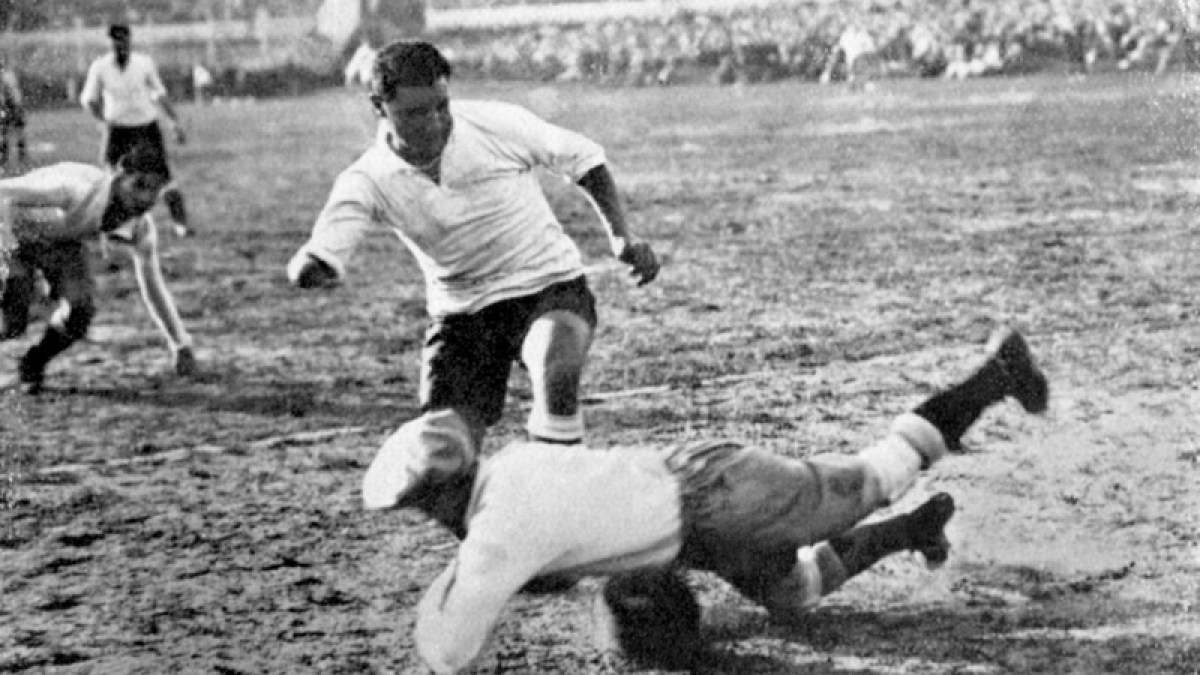Hector Castro is an icon of Uruguayan football;
He made his own football glory despite the misfortune that struck him at an early age.
Castro was born on November 29, 1904 in Montevideo, the capital of Uruguay, before he was exposed to a difficult situation that did not prevent him from playing football.
Castro lived in harsh conditions, after his right arm was amputated with a chainsaw in an accident he suffered at the age of 13, and because of that incident Castro bore the nickname "El manco", meaning the one-armed or "disfigured" arm.
Hector Castro, the legend of Uruguay
Six years after the incident, Castro joined the ranks of the Nacional team, one of the largest and most prestigious clubs in Uruguay, and remained a player in it until 1932.
In the summer of that year, Castro moved from Nacional to Argentine Estudiantes, in an experience that lasted only one year, after which the Uruguayan star returned to his mother team, which retired with his shirt in 1936.
🇺🇾 Uruguay 1930
🏆🇺🇾
🇺🇾 Uruguay 4-2 Argentina 🇦🇷
⚽️ 1-0 |
Pablo Dorado 12'
⚽️ 1-1 |
Carlos Peucelle 20'
⚽️ 1-2 |
Guillermo Stabile 37'
⚽️ 2-2 |
Pedro Cea 57'
⚽️ 3-2 |
Victoriano Iriarte 68'
⚽️ 4-2 |
Hector Castro 89'
🎥 https://t.co/Vk6EElrsSt pic.twitter.com/bqQoxxwmFx
— Sphera Sports (@SpheraSports) July 15, 2018
During this long journey, Al Manco won the Uruguayan league title 3 times, in the seasons 1923-1924, 1932-1933, and 1933-1934.
Castro played his first match for the Uruguay national team on November 1, 1923, after being called up by coach Leonardo de Luca, and the outstanding striker was close to reaching his 19th year.
He joined the Celeste team in the 1928 Summer Olympics, Amsterdam, and participated in two matches.
Castro remained on the bench in his country's match against the Netherlands in the first round, before shining in the quarter-final against Germany, and made two crucial passes that contributed to the "Celeste" victory over Germany 4-1.
Castro returned to sitting on the bench in the semi-final against Italy, but that did not prevent Uruguay from beating Italy, albeit with a 3-2 score.
In the final against Argentina, Castro was in the starting lineup for his country, and that match ended in a 1-1 draw, so the match was repeated according to the regulations at that period, and the second confrontation in which Hector did not appear ended with his country's 2-1 victory, and with it the team won the Olympic gold.
And this was the second time in a row for the Uruguayan team, which won the football gold at the Olympics, after the 1924 Paris edition, in which Castro did not appear in any matches, despite his presence on the list.
In 1930, Castro was on a date with a new international appearance, this time in the first edition of the World Cup hosted by his country.
Winning the first World Cup
Uruguay played only two matches in the group stage, defeating Peru in the first with a single goal scored by Castro, which is the first World Cup goal for the "Celeste" team, and in the second victory over Romania by 4-0 in the absence of Hector.
With these results, the host country topped Group C, reaching the semi-finals, along with Argentina, Yugoslavia and the United States of America.
And before the final, Uruguay swept its Yugoslav counterpart 6-1, in a match that Castro missed, who made a safe return in the final.
On July 30, 1930, Castro was in the starting line-up for his country in the World Cup final, against Argentina.
That match reached its last moments, and the result indicated that "Celeste" advanced 3-2, so Castro appeared and fired a bullet of mercy at "Tango" by scoring the fourth goal in the 89th minute, to secure Uruguay's victory in the match and the World Cup.
🦾 Hector Castro accidentally cut off his own arm while using an electric saw as a 13-year-old & was consequently known as 'El Manco' (The One-Armed One)
🇺🇾 It didn't stop him from scoring the only goal as @Uruguay won their #WorldCup debut 90 years ago today 👏 pic.twitter.com/dSEVPIancj
— FIFA World Cup (@FIFAWorldCup) July 18, 2020
Castro's one-armed championships did not stop at the Amsterdam Olympics and World Cup gold, but also extended to continental titles.
Castro climbed to the podium in the Copa America twice, the first in 1926 after Uruguay topped the standings with 8 points, in a version where only 5 teams participated.
The same achievement was repeated in 1935, in a tournament in which only 3 teams participated, besides Uruguay, Argentina, Peru and Chile.
In total, Castro wore the Uruguayan shirt in 27 matches, during which he scored 19 goals, according to the numbers and statistics of the transfermarkt website.
Shortly after his retirement from football as a player, Castro became involved in coaching, which he continued with his parent club Nacional.
Under the leadership of "Al Manco", Nacional won the Uruguayan league title 5 times, 4 of them in a row between 1940 and 1943, and the last was in 1952.
Castro's death caused a great shock in Uruguay, especially as he suddenly breathed his last, in full health, as he suffered a heart attack that ended his life on September 15, 1960, at the age of 55.

